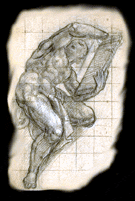
|
||
|
|
Basics
Start Here
Anglicans Believe ...
The Prayer Book
The Bible
News
News Centre
News Archive
Newspapers Online
Official Publications
Resources
Resources A to Z, including
Biblical Study
Book of Common Prayer
Books and Magazines
Exchanges
Events
Liturgy
Music
Religious Orders
Preaching
Theology
Youth
Worldwide Anglicanism
Anglican Communion
In Full Communion
Not in the Communion
Dioceses and Parishes
Africa
Australia
Canada
England
Europe
Ireland
Japan
New Zealand
Scotland
USA
Wales
World
Anglicans Online
Archives
Add a Site to AO
Tell Us What You Think
Link to AO
Staff
Awards and Publicity
Beginnings, AO Today
Our Sponsors
Hallo again to all.
East. West. Flesh. Spirit. Wise. Foolish. Sometimes paradox seems embodied
in the Christian tradition and often glorified in our own Anglican Communion.  With
every attempt to define more clearly just what that communion is, there is a corresponding concern that much that is precious about Anglicanism
lies at least partly in its very elusiveness.
With
every attempt to define more clearly just what that communion is, there is a corresponding concern that much that is precious about Anglicanism
lies at least partly in its very elusiveness.
An English Church historian, whose name is long forgotten, once wrote that Anglicanism is 'more a mood than a theology'. No doubt some would think the last decades have shown us to be in a bad mood. But perhaps the Anglican shying-away from a net of definitions, confessions, grim doctrinal statements, and rigid rubrics is ultimately a Good Thing. The Primates, just ending their meeting in Kanuga, North Carolina, seem to have resorted to a classically Anglican solution to some knotty issues in the communion, especially that of the interrelationship of authority amongst the national churches and provinces. They have agreed to study the matter; a report will be prepared for the 2002 Primates Meeting.
A renowned authority on canon law in the Anglican Communion, Norman Doe, addressed the Primates, and his paper will be one of the background documents for that report. At the 1998 Lambeth Conference, another brilliant canonist, Edward Norman, discussed the issue of authority in the Anglican Communion in a devastatingly learned talk. If you've not chosen your Lenten reading, these two lectures would be both enlightening and challenging, and may well inspire you to think about the interplay of law, independence, grace, and authority in our beloved church.
After considerable study—which appears to have encompassed much looking into those selfsame issues—a high-level review group have concluded their in-depth look at Royal Peculiars. You'll find all the links in our News Centre, but we note the first recommendation in the report: 'The independence of the Royal Peculiars from diocesan and provincial control should be preserved'. Also in the News Centre, you'll find the article in a Melbourne newspaper that first drew our attention to this thoughtful essay by Hedley Beane, on what to do when you're caught between 'yes' and 'no' when asked to make a commitment.
We've had a request from a student in the Netherlands, who says: 'I am working on my doctoral dissertation and, as part of my research, attempting to collect all of the existent Anglican canonical legislation and policy statements on marriage and divorce related matters. This can be from a province, an individual diocese, or a body in full communion'. If you can assist, please email the student directly or forward information to: Tiensestraat 112, 3000 Leuven, Belgium. If this subject also interests you, we suggest canonlaw.anglican.org, as a splendid starting place for such things.
Turning to our new listings, an Anglican parish in Istanbul, Turkey and the ancient city of Antioch, also in Turkey, coincidentally make their appearance together. A two-day conference at the University of St Andrews Institute for Theology, Imagination, and the Art is wrestling with the ever-present tension between flesh and spirit. And two new books on 'Frenchy', aka Francesco di Pietro Bernardone, the ever-young St Francis of Assisi—who did quite a bit of wrestling with his own Brother Ass—are welcomed by Geoffrey Moorhouse, in a New York Times review. Moorhouse notes that
He frightens the rest of us a bit because he reminds us, as no other did, how much it costs to be what we could be, to be what maybe we were meant to be.
Wow.
See you next week.
 |
 |
|
| Cynthia
McFarland cmcf@anglicansonline.org |
Brian
Reid reid@anglicansonline.org |
Last updated: 11 March 2001
URL: http://anglicansonline.org/